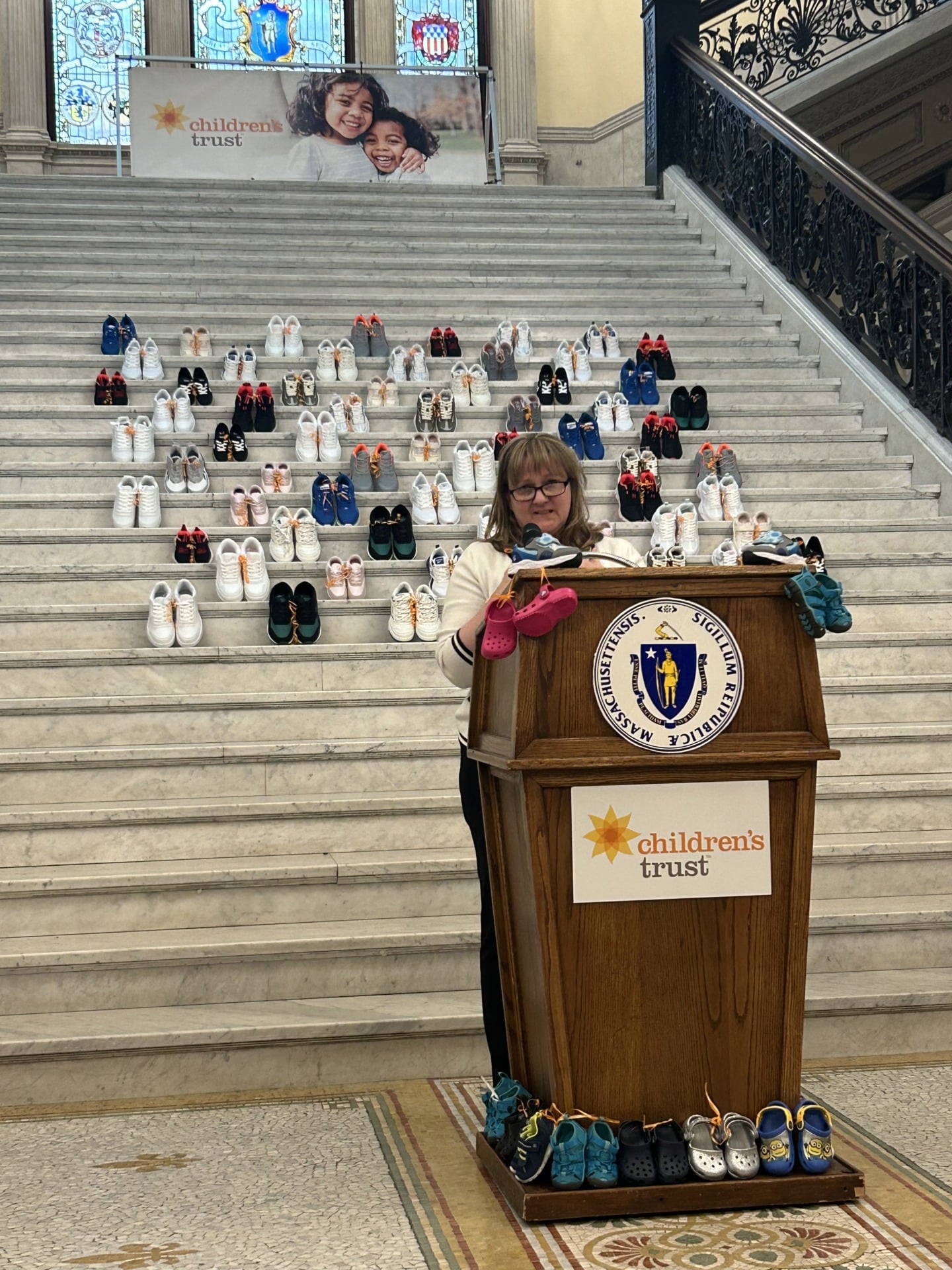table of contents
In recognition of Child Abuse Prevention Month, MSPCC was honored to join The Children’s Trust at the Massachusetts State House on April 16 for their “Step Up for Kids” event, during which advocates and legislators came together to voice support for an increased salary floor for Healthy Families home visitors. Healthy Families is a voluntary and free home-based family coaching program that supports first-time parents under the age of 23 and helps them create stable, nurturing environments for their children. Home visitors play a key role in supporting new parents by teaching them about baby and toddler care, ensuring they have a solid understanding of child development, and assisting them in achieving their own educational, professional, and housing goals.

Angie Morrell, MSPCC’s Regional Director of Prevention Services, speaks to the crowd about the importance of home visitors. The shoes on the staircase behind her represent daily cases of child abuse and neglect throughout the state.
Angie Morrell, MSPCC’s Regional Director of Prevention Services, spoke at the event about the importance of home visiting. Below, please find her speech.
Thank you all for being here and for your commitment to strengthening families across Massachusetts. My name is Angie Morrell, and I am the Regional Director of Prevention Services at MSPCC, a division of Eliot Community Human Services. I have spent the last 15 years working with Healthy Families Massachusetts, a program funded by the Children’s Trust, and I have seen firsthand the incredible impact of this work.
You’ve already heard today about how Healthy Families is proven to support young parents and improve outcomes for children. But I want to bring that data to life by sharing what’s happening on the ground in Central Massachusetts where I work and how, with your support, we can ensure this program continues to thrive.
What makes Healthy Families so successful is the trusted relationships that home visitors build with families. Our home visitors do more than deliver information. They walk alongside parents, helping them navigate the challenges of early parenthood with confidence and strength. They provide encouragement, stability, and a sense of possibility for young families who are working hard to create the best futures for their children.
The results speak for themselves: families who are more engaged, more prepared, and better supported are the families who are thriving. But here’s where we need your help. It is vital that we make sure our home visitors have the support they need to stay in these jobs so that we can keep delivering these services in our communities.
Right now, we are facing significant staffing challenges. This is also true for most of my Healthy Families colleagues across the state. In the last year, our program lost six home visitors—that’s one every two months – and recruiting new staff has been difficult. Home visiting is already a demanding job, and staff salaries are simply not competitive. Home visitors go into unfamiliar neighborhoods, work with families facing complex challenges, and adapt to ever-changing situations. They do this work because they believe in the power of this program but that is not enough to sustain this essential work.
Every time a home visitor leaves, it disrupts the progress of the families they serve. Caseloads increase for remaining staff, making it harder to provide the same level of care and impacting morale. Parents who have built trust with their home visitor have to start over.
On average, nearly half of the families in the program leave when their home visitor quits—not because they don’t need support, but because that trusted relationship with their home visitor is what keeps them engaged. That vital relationship between a family and their Home Visitor is crucial – it is the foundation of the program.
I’d like to tell you a story about a program participant named Lucy. Lucy first joined Healthy Families just before her 21st birthday, eager for support as a new mother. She quickly bonded with her Home Visitor, but when that staff member resigned six weeks later, Lucy left too, saying, “I just don’t want to start over again.”
Six months later, Lucy was referred back—this time by the Department of Children and Families due to concerns about neglect. She built trust with a new Home Visitor, but after ten months, that staff member went on medical leave. Without another available Home Visitor, Lucy’s case was transferred to a supervisor she didn’t know. Despite outreach attempts, she disengaged, and her case was eventually closed.
Determined to get help, Lucy returned a third time, now seeking mental health services and support for her child, who she worried might be on the autism spectrum. She was connected to a therapist and Early Intervention. Then, a turning point—her former Home Visitor returned from leave, and Lucy eagerly resumed working with them.
Now, four months later, Lucy is still engaged and doing well. But her journey raises important questions: What if she had never lost that first Home Visitor? Would she have stayed in the program continuously? Avoided DCF involvement? Accessed therapy sooner? Identified her child’s needs earlier?
Lucy’s story underscores a simple but critical truth—consistent, trusted Home Visitors are vital to the success of families in our program. Stability matters. Relationships matter. And when we provide that consistency, we help change lives.
Healthy Families is an evidenced based, proven program and one that exists in every community in Massachusetts. We know it works. And we know that prioritizing home visiting programs means stronger families, healthier children, and more resilient communities.
To those of you who have already visited a Healthy Families site—thank you. You’ve seen the impact firsthand. And to those who haven’t yet, I invite you to come meet the incredible home visitors working in your district. See the difference they make.
Thank you.


